Thom Hartmann
January 1, 2025
ALTERNET

Thousands of Trump supporters gather at the Supreme Court to show their support for President Trump after the election. (Shutterstock.com)
“Those who control the present, control the past; and those who control the past control the future.” —George Orwell, 1984
From outlawing the polio vaccine to ignoring the scientific consensus on gender dysphoria to refusing to wear masks in hospitals to trying to strip evolution and science from our schools, stupid has become fashionable in today’s GOP.
When Republican politicians want to score points, they criticize their opponents as having had “elite” educations; the GOP’s war against Ivy League colleges was particularly evident during the student protests of Israel’s slaughter in Gaza. Congressional Republican inquisitors' voices dripped with scorn and contempt as they grilled university presidents.
It wasn’t always this way.
I remember when the USSR launched Sputnik, the first satellite to orbit the Earth. It was the fall of 1957, I was six years old, and my dad and I watched it arc over our house from our backyard one clear October night. My best friend’s father, a ham radio operator, let us listen on his shortwave radio to the “beep beep beep” it was emitting when it was over North America. I’d never seen my dad so rattled.
That dramatic technological achievement lit a major fire under the Eisenhower administration and Congress. In his January 27, 1958 State of the Union address, Republican President Eisenhower pointed to Sputnik and demanded Congress fund a dramatic transformation of America’s educational system:
“With this kind of all-inclusive campaign, I have no doubt that we can create the intellectual capital we need for the years ahead, invest it in the right places--and do all this, not as regimented pawns, but as free men and women!”
In less than a year Congress wrote and passed the National Defense Education Act that poured piles of money into our public schools and rolled out programs for gifted kids.
I was lucky enough to be enrolled in one of those in 1959: by the time I left elementary school I was functioning at high school and college levels in math, science, and English. I’d had two years of foreign language and two years of experimental music instruction. IQ tests were all the rage: mine was 141 and my best friend, Terry, was 142, something he never let me forget.
Most all of those programs died over the following decades as a result of Reagan’s war on public education, which began with his bringing private religious school moguls like Jerry Falwell and bigots like Bill Bennett into the White House.
Repudiating Eisenhower’s embrace of public education, Reagan put Bennett in charge of the Department of Education, which Reagan had campaigned on shutting down altogether. Bennett is probably best known for defending his proclamation that:
“If you wanted to reduce crime you could, if that were your sole purpose, you could abort every Black baby in this country, and your crime rate would go down.”
Much like Bennett back in the day, the catch phrase among white supremacists and their fellow travelers today is that “Western Civilization” is either under attack or at risk because we teach history, tolerance, and critical thinking skills in our public schools, which are often racially integrated. The answer, Republicans will tell you, is to defund our public schools.
When Reagan was elected in 1980, the federal share of total education spending in America was 12 percent; when he left office in disgrace in 1989 amid “Iran/Contra” rumors he’d cut a deal with the Iranians to keep the American hostages to screw Jimmy Carter, that share had collapsed to a mere six percent. (It’s three percent today.)
Reagan also wanted to amend the Constitution to allow mandatory school prayer, and unsuccessfully proposed a national tax credit — a sort of tax-system-based national voucher system — that parents could use to send their kids to religious schools like Falwell’s.
Reagan made anti-intellectualism a political weapon, repeatedly criticizing colleges and professors throughout his political career. When asked why he’d taken a meat-axe to higher education and was pricing college out of the reach of most Americans, he said that college students were “too liberal” and America “should not subsidize intellectual curiosity.”
Four days before the Kent State Massacre of May 5, 1970, Governor Reagan called students protesting the Vietnam war across America “brats,” “freaks” and “cowardly fascists,” adding, as The New York Timesnoted at the time, “If it takes a bloodbath, let’s get it over with. No more appeasement!”
Before Reagan became president, states paid 65 percent of the costs of colleges, and federal aid covered another 15 or so percent, leaving students to cover the remaining 20 percent with their tuition payments.
That’s how it works in many developed nations; in most northern European countries college is not only free, but the government pays students a stipend to cover books and rent.
Here in America, though, the numbers are pretty much reversed from pre-1980, with students now covering about 80 percent of the costs. Thus the need for student loans here in the USA.
Ever since Reagan’s presidency, the core of Republican positions on public education has been five-fold:
1. Let white students attend schools that are islands of white privilege where they don’t have to confront the true racial history of America,
2. Use public money to support private, for-profit, and religious schools that can accomplish this (and cycle some of that money back to Republican politicians),
3. Destroy public schools’ teachers’ unions,
4. End the teaching of science, critical thinking, evolution, and sex ed, and,
5. Bring fundamentalist Christianity into the classroom.
Earlier this year, Republican Senator Marco Rubio called America’s public school system a “cesspool of Marxist indoctrination.”
“Dangerous academic constructs like critical race theory and radical gender theory are being forced on elementary school children,” Rubio wrote for the American Conservative magazine, adding, “We need to ensure no federal funding is ever used to promote these radical ideas in schools.”
Instead, multiple Republican-controlled states are now actively gutting their public schools with statewide voucher programs and instituting mandatory bible instruction or posting of the Ten Commandments. Book bans and panics around queer kids using bathrooms or playing sports are the new wedge issues.
There is no more powerful urge we humans can experience than to protect and defend our children. For most people it beats hunger, sex, and money. So if you’re a politician looking for an issue to motivate voters, just tell them their children are under attack. It’s cynical but effective.
In an interview for Semafor, Trump’s former Secretary of State Mike Pompeo laid it out:
“I tell the story often — I get asked ‘Who’s the most dangerous person in the world? Is it Chairman Kim, is it Xi Jinping?’ The most dangerous person in the world is [American Federation of Teachers President] Randi Weingarten. It’s not a close call. If you ask, ‘Who’s the most likely to take this republic down?’ It would be the teacher’s unions, and the filth that they’re teaching our kids…”
Just a few months ago, Donald Trump laid out his plan to deal with the “major problem” America is facing. That problem, he said, is:
“[W]e have ‘pink-haired communists teaching our kids.’”
Turning the Constitution upside down and arguing the Founders intended to protect teaching schoolchildren religion, Trump elaborated, arguing that mixing religion, politics, and education was the intention of that document:
“The Marxism being preached in our schools is also totally hostile to Judeo-Christian teachings, and in many ways it’s resembling an established new religion. We can’t let that happen. For this reason, my administration will aggressively pursue intentional violations to the establishment clause and the free exercise clause of the Constitution.”
As Jonathan Chait wrote for New York magazine:
“More ominously, at every level of government, Republicans have begun to act on these beliefs. Over the past three years, legislators in 28 states have passed at least 71 bills controlling what teachers and students can say and do at school. A wave of library purges, subject-matter restrictions, and potential legal threats against educators has followed.”
George W. Bush followed the trend, bragging about his pathetic performance in college at Yale’s 2001 commencement:
“To those of you who received honors, awards, and distinctions, I say, well done. And to the C students I say, you, too, can be president of the United States!”
Similarly, JD Vance gave a speech in 2021 titled Universities Are The Enemy.
This isn’t the first time elected officials have used public education as a political weapon. In 1844, 25 people died and over 100 were severely injured in riots in Philadelphia over whether there should be daily Bible readings in that city’s schools. Two churches and several city blocks of homes were burned to the ground.
The Scopes Monkey Trial of 1925 didn’t provoke riots, but was a major event in the history of public education. Tennessee high school teacher John Scopes was charged and convicted of the crime of teaching evolution. Mississippi and Arkansas joined Tennessee in passing laws making such instruction a crime that stood until the 1967 repeal of the Butler Act.
While Republicans across the country successfully rode a wave of white outrage about Critical Race Theory in November’s election, polls suggest the issue is really meaningful only to a fragment of the American electorate: an anti-science “Christian” subset of white Republican voters.
The annual PRRI American Values Surveyfound:
“Americans overwhelmingly favor teaching children history that includes both the good and bad aspects of our history so that they can learn from the past, versus refraining from teaching aspects of history that could make them feel uncomfortable or guilty about what their ancestors did in the past (92% vs. 5%).
“There are no substantial partisan differences, though Republicans favor excluding aspects of history slightly more (7%) than Democrats and Independents (both 4%). There are few differences across religious traditions or demographics. This consensus holds up across different levels of exposure to critical race theory: 92% of those who have heard a lot about critical race theory, 94% of those who have heard a little, and 93% of those who have heard nothing about it state that we should teach children the good and bad of history.”
Nonetheless, they note:
“[A] majority of Republicans (54%), compared with 27% of independents and only 7% of Democrats, believe that teachers and librarians are indoctrinating children.”
America spent $794.7 billion on primary education last year. For-profit private schools and megachurches that run schools look at that pile of money and drool. Republicans are committed to delivering as much of it to them as possible, regardless of the damage it does to our nation’s kids.
Their strategy for privatizing our public schools is pretty straightforward, and echoes the plan of action Republicans are using right now to replace real Medicare with the privatized Medicare Advantage scam.
First, they falsely claim that they’ll deliver a better product at a lower cost. In the education realm, we see this with Florida and several other Red states now offering vouchers that can be used at private or religious schools to every student in the state.
(Nearly 2,300 private schools in Florida accept vouchers, but “69 percent are unaccredited, 58 percent are religious, and nearly one-third are for-profit.”)
As more and more students use the vouchers to flee public schools, the public schools sink into deeper and deeper financial troubles, which cut the quality of teaching and upkeep of the school buildings, causing even more students to use the vouchers.
Because the vouchers never cover the full cost of private school tuition (typically they pay for half to two-thirds), the truly poor can’t use them: the result is that the public school system becomes ghettoized, leading to even more flight by middle- and upper-class (mostly white) people.
Once the public schools are dead and the state has transitioned entirely to private schools, the state will claim budget problems and begin to dial back the amounts available for vouchers. (The same will happen with Medicare Advantage once real Medicare is dead.)
This will widen the relationship between the educational and wealth divides; the racial and class cleavage will become so great that the state will have effectively gone back to a “separate but equal” educational system. Which, of course, is the GOP’s goal and has been since 1954.
Republicans are generally convinced — and surveys show they’re right — that when people have a good, well-rounded education they will vote for Democrats, who explicitly value science and egalitarian social values.
Thus, keeping our kids ignorant and destroying one of America’s largest unions, all while helping their education and religion industry friends get rich, is a complete win-win.
Much of this battle is playing out in state houses around the country, but there’s a huge and well-funded effort to take control of local school boards as well.
Driving this ethos with a constant flood of anti-intellectual, anti-science propaganda is an army of rightwing podcasters, YouTubers, hate radio hosts, and the billionaire-owned Fox “News” network (among others). They argue, essentially, that “stupid is the new smart.”
Barely coherent politicians like Tommy Tuberville and Marjorie Taylor Greene are their heroes. Donald Trump, who still refuses to release his grades, is their avatar. Bob Kennedy is their avenging angel. And people with college educations — and teachers/professors — are their enemies.
Bottom line: the Republican war on public education and science is real, and if we want to stop it we must get involved. Show up for your local school board meetings and, if you have the time and ability, run for a position on the board.
Lobby your state legislators and support pro-science and pro-education politicians. It’s time to make smart cool again!
Our children’s and grandchildren’s futures are literally at stake.

Thousands of Trump supporters gather at the Supreme Court to show their support for President Trump after the election. (Shutterstock.com)
“Those who control the present, control the past; and those who control the past control the future.” —George Orwell, 1984
From outlawing the polio vaccine to ignoring the scientific consensus on gender dysphoria to refusing to wear masks in hospitals to trying to strip evolution and science from our schools, stupid has become fashionable in today’s GOP.
When Republican politicians want to score points, they criticize their opponents as having had “elite” educations; the GOP’s war against Ivy League colleges was particularly evident during the student protests of Israel’s slaughter in Gaza. Congressional Republican inquisitors' voices dripped with scorn and contempt as they grilled university presidents.
It wasn’t always this way.
I remember when the USSR launched Sputnik, the first satellite to orbit the Earth. It was the fall of 1957, I was six years old, and my dad and I watched it arc over our house from our backyard one clear October night. My best friend’s father, a ham radio operator, let us listen on his shortwave radio to the “beep beep beep” it was emitting when it was over North America. I’d never seen my dad so rattled.
That dramatic technological achievement lit a major fire under the Eisenhower administration and Congress. In his January 27, 1958 State of the Union address, Republican President Eisenhower pointed to Sputnik and demanded Congress fund a dramatic transformation of America’s educational system:
“With this kind of all-inclusive campaign, I have no doubt that we can create the intellectual capital we need for the years ahead, invest it in the right places--and do all this, not as regimented pawns, but as free men and women!”
In less than a year Congress wrote and passed the National Defense Education Act that poured piles of money into our public schools and rolled out programs for gifted kids.
I was lucky enough to be enrolled in one of those in 1959: by the time I left elementary school I was functioning at high school and college levels in math, science, and English. I’d had two years of foreign language and two years of experimental music instruction. IQ tests were all the rage: mine was 141 and my best friend, Terry, was 142, something he never let me forget.
Most all of those programs died over the following decades as a result of Reagan’s war on public education, which began with his bringing private religious school moguls like Jerry Falwell and bigots like Bill Bennett into the White House.
Repudiating Eisenhower’s embrace of public education, Reagan put Bennett in charge of the Department of Education, which Reagan had campaigned on shutting down altogether. Bennett is probably best known for defending his proclamation that:
“If you wanted to reduce crime you could, if that were your sole purpose, you could abort every Black baby in this country, and your crime rate would go down.”
Much like Bennett back in the day, the catch phrase among white supremacists and their fellow travelers today is that “Western Civilization” is either under attack or at risk because we teach history, tolerance, and critical thinking skills in our public schools, which are often racially integrated. The answer, Republicans will tell you, is to defund our public schools.
When Reagan was elected in 1980, the federal share of total education spending in America was 12 percent; when he left office in disgrace in 1989 amid “Iran/Contra” rumors he’d cut a deal with the Iranians to keep the American hostages to screw Jimmy Carter, that share had collapsed to a mere six percent. (It’s three percent today.)
Reagan also wanted to amend the Constitution to allow mandatory school prayer, and unsuccessfully proposed a national tax credit — a sort of tax-system-based national voucher system — that parents could use to send their kids to religious schools like Falwell’s.
Reagan made anti-intellectualism a political weapon, repeatedly criticizing colleges and professors throughout his political career. When asked why he’d taken a meat-axe to higher education and was pricing college out of the reach of most Americans, he said that college students were “too liberal” and America “should not subsidize intellectual curiosity.”
Four days before the Kent State Massacre of May 5, 1970, Governor Reagan called students protesting the Vietnam war across America “brats,” “freaks” and “cowardly fascists,” adding, as The New York Timesnoted at the time, “If it takes a bloodbath, let’s get it over with. No more appeasement!”
Before Reagan became president, states paid 65 percent of the costs of colleges, and federal aid covered another 15 or so percent, leaving students to cover the remaining 20 percent with their tuition payments.
That’s how it works in many developed nations; in most northern European countries college is not only free, but the government pays students a stipend to cover books and rent.
Here in America, though, the numbers are pretty much reversed from pre-1980, with students now covering about 80 percent of the costs. Thus the need for student loans here in the USA.
Ever since Reagan’s presidency, the core of Republican positions on public education has been five-fold:
1. Let white students attend schools that are islands of white privilege where they don’t have to confront the true racial history of America,
2. Use public money to support private, for-profit, and religious schools that can accomplish this (and cycle some of that money back to Republican politicians),
3. Destroy public schools’ teachers’ unions,
4. End the teaching of science, critical thinking, evolution, and sex ed, and,
5. Bring fundamentalist Christianity into the classroom.
Earlier this year, Republican Senator Marco Rubio called America’s public school system a “cesspool of Marxist indoctrination.”
“Dangerous academic constructs like critical race theory and radical gender theory are being forced on elementary school children,” Rubio wrote for the American Conservative magazine, adding, “We need to ensure no federal funding is ever used to promote these radical ideas in schools.”
Instead, multiple Republican-controlled states are now actively gutting their public schools with statewide voucher programs and instituting mandatory bible instruction or posting of the Ten Commandments. Book bans and panics around queer kids using bathrooms or playing sports are the new wedge issues.
There is no more powerful urge we humans can experience than to protect and defend our children. For most people it beats hunger, sex, and money. So if you’re a politician looking for an issue to motivate voters, just tell them their children are under attack. It’s cynical but effective.
In an interview for Semafor, Trump’s former Secretary of State Mike Pompeo laid it out:
“I tell the story often — I get asked ‘Who’s the most dangerous person in the world? Is it Chairman Kim, is it Xi Jinping?’ The most dangerous person in the world is [American Federation of Teachers President] Randi Weingarten. It’s not a close call. If you ask, ‘Who’s the most likely to take this republic down?’ It would be the teacher’s unions, and the filth that they’re teaching our kids…”
Just a few months ago, Donald Trump laid out his plan to deal with the “major problem” America is facing. That problem, he said, is:
“[W]e have ‘pink-haired communists teaching our kids.’”
Turning the Constitution upside down and arguing the Founders intended to protect teaching schoolchildren religion, Trump elaborated, arguing that mixing religion, politics, and education was the intention of that document:
“The Marxism being preached in our schools is also totally hostile to Judeo-Christian teachings, and in many ways it’s resembling an established new religion. We can’t let that happen. For this reason, my administration will aggressively pursue intentional violations to the establishment clause and the free exercise clause of the Constitution.”
As Jonathan Chait wrote for New York magazine:
“More ominously, at every level of government, Republicans have begun to act on these beliefs. Over the past three years, legislators in 28 states have passed at least 71 bills controlling what teachers and students can say and do at school. A wave of library purges, subject-matter restrictions, and potential legal threats against educators has followed.”
George W. Bush followed the trend, bragging about his pathetic performance in college at Yale’s 2001 commencement:
“To those of you who received honors, awards, and distinctions, I say, well done. And to the C students I say, you, too, can be president of the United States!”
Similarly, JD Vance gave a speech in 2021 titled Universities Are The Enemy.
This isn’t the first time elected officials have used public education as a political weapon. In 1844, 25 people died and over 100 were severely injured in riots in Philadelphia over whether there should be daily Bible readings in that city’s schools. Two churches and several city blocks of homes were burned to the ground.
The Scopes Monkey Trial of 1925 didn’t provoke riots, but was a major event in the history of public education. Tennessee high school teacher John Scopes was charged and convicted of the crime of teaching evolution. Mississippi and Arkansas joined Tennessee in passing laws making such instruction a crime that stood until the 1967 repeal of the Butler Act.
While Republicans across the country successfully rode a wave of white outrage about Critical Race Theory in November’s election, polls suggest the issue is really meaningful only to a fragment of the American electorate: an anti-science “Christian” subset of white Republican voters.
The annual PRRI American Values Surveyfound:
“Americans overwhelmingly favor teaching children history that includes both the good and bad aspects of our history so that they can learn from the past, versus refraining from teaching aspects of history that could make them feel uncomfortable or guilty about what their ancestors did in the past (92% vs. 5%).
“There are no substantial partisan differences, though Republicans favor excluding aspects of history slightly more (7%) than Democrats and Independents (both 4%). There are few differences across religious traditions or demographics. This consensus holds up across different levels of exposure to critical race theory: 92% of those who have heard a lot about critical race theory, 94% of those who have heard a little, and 93% of those who have heard nothing about it state that we should teach children the good and bad of history.”
Nonetheless, they note:
“[A] majority of Republicans (54%), compared with 27% of independents and only 7% of Democrats, believe that teachers and librarians are indoctrinating children.”
America spent $794.7 billion on primary education last year. For-profit private schools and megachurches that run schools look at that pile of money and drool. Republicans are committed to delivering as much of it to them as possible, regardless of the damage it does to our nation’s kids.
Their strategy for privatizing our public schools is pretty straightforward, and echoes the plan of action Republicans are using right now to replace real Medicare with the privatized Medicare Advantage scam.
First, they falsely claim that they’ll deliver a better product at a lower cost. In the education realm, we see this with Florida and several other Red states now offering vouchers that can be used at private or religious schools to every student in the state.
(Nearly 2,300 private schools in Florida accept vouchers, but “69 percent are unaccredited, 58 percent are religious, and nearly one-third are for-profit.”)
As more and more students use the vouchers to flee public schools, the public schools sink into deeper and deeper financial troubles, which cut the quality of teaching and upkeep of the school buildings, causing even more students to use the vouchers.
Because the vouchers never cover the full cost of private school tuition (typically they pay for half to two-thirds), the truly poor can’t use them: the result is that the public school system becomes ghettoized, leading to even more flight by middle- and upper-class (mostly white) people.
Once the public schools are dead and the state has transitioned entirely to private schools, the state will claim budget problems and begin to dial back the amounts available for vouchers. (The same will happen with Medicare Advantage once real Medicare is dead.)
This will widen the relationship between the educational and wealth divides; the racial and class cleavage will become so great that the state will have effectively gone back to a “separate but equal” educational system. Which, of course, is the GOP’s goal and has been since 1954.
Republicans are generally convinced — and surveys show they’re right — that when people have a good, well-rounded education they will vote for Democrats, who explicitly value science and egalitarian social values.
Thus, keeping our kids ignorant and destroying one of America’s largest unions, all while helping their education and religion industry friends get rich, is a complete win-win.
Much of this battle is playing out in state houses around the country, but there’s a huge and well-funded effort to take control of local school boards as well.
Driving this ethos with a constant flood of anti-intellectual, anti-science propaganda is an army of rightwing podcasters, YouTubers, hate radio hosts, and the billionaire-owned Fox “News” network (among others). They argue, essentially, that “stupid is the new smart.”
Barely coherent politicians like Tommy Tuberville and Marjorie Taylor Greene are their heroes. Donald Trump, who still refuses to release his grades, is their avatar. Bob Kennedy is their avenging angel. And people with college educations — and teachers/professors — are their enemies.
Bottom line: the Republican war on public education and science is real, and if we want to stop it we must get involved. Show up for your local school board meetings and, if you have the time and ability, run for a position on the board.
Lobby your state legislators and support pro-science and pro-education politicians. It’s time to make smart cool again!
Our children’s and grandchildren’s futures are literally at stake.
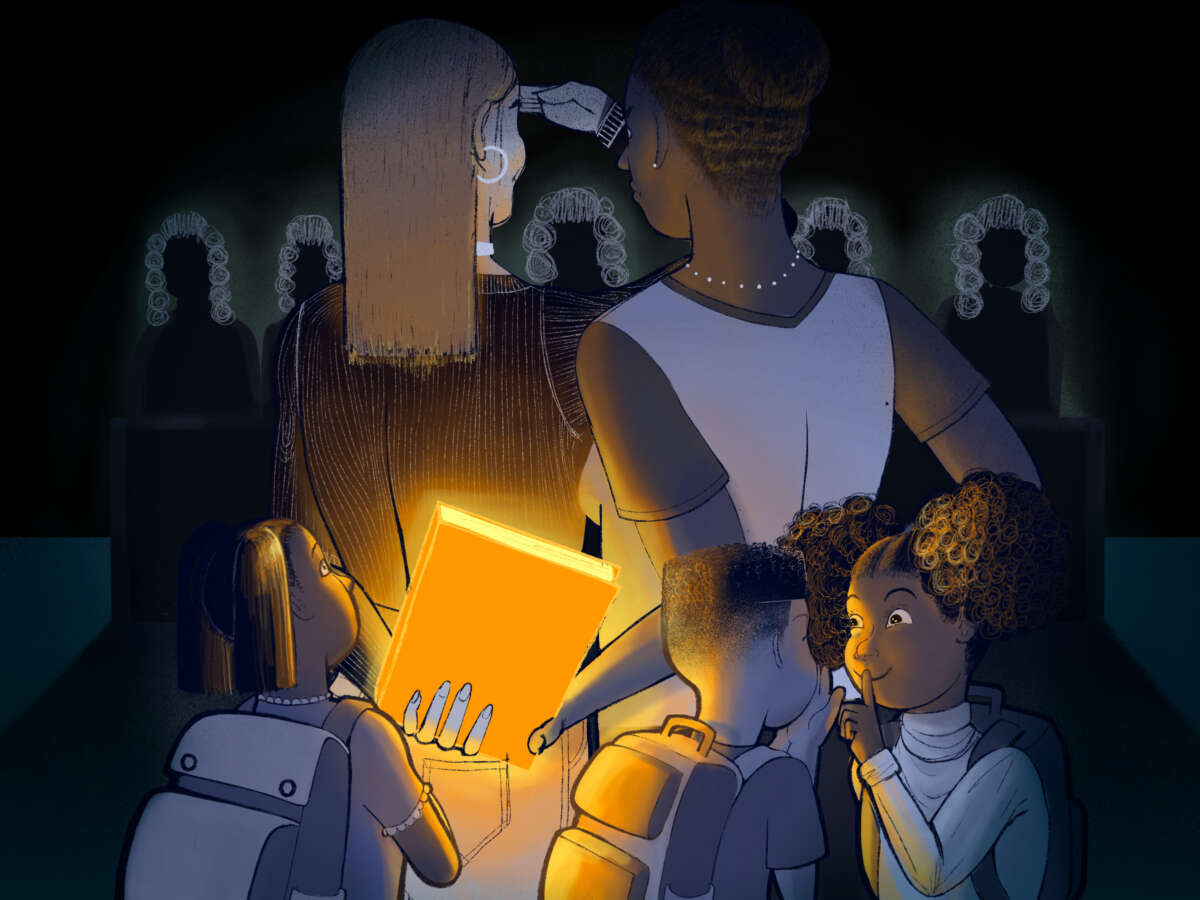
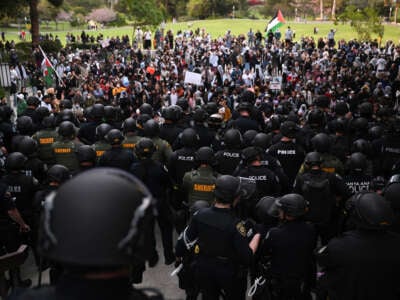
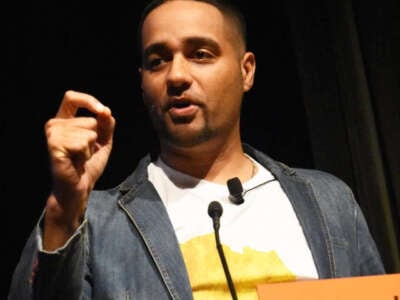
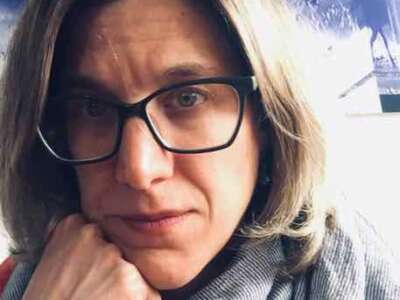
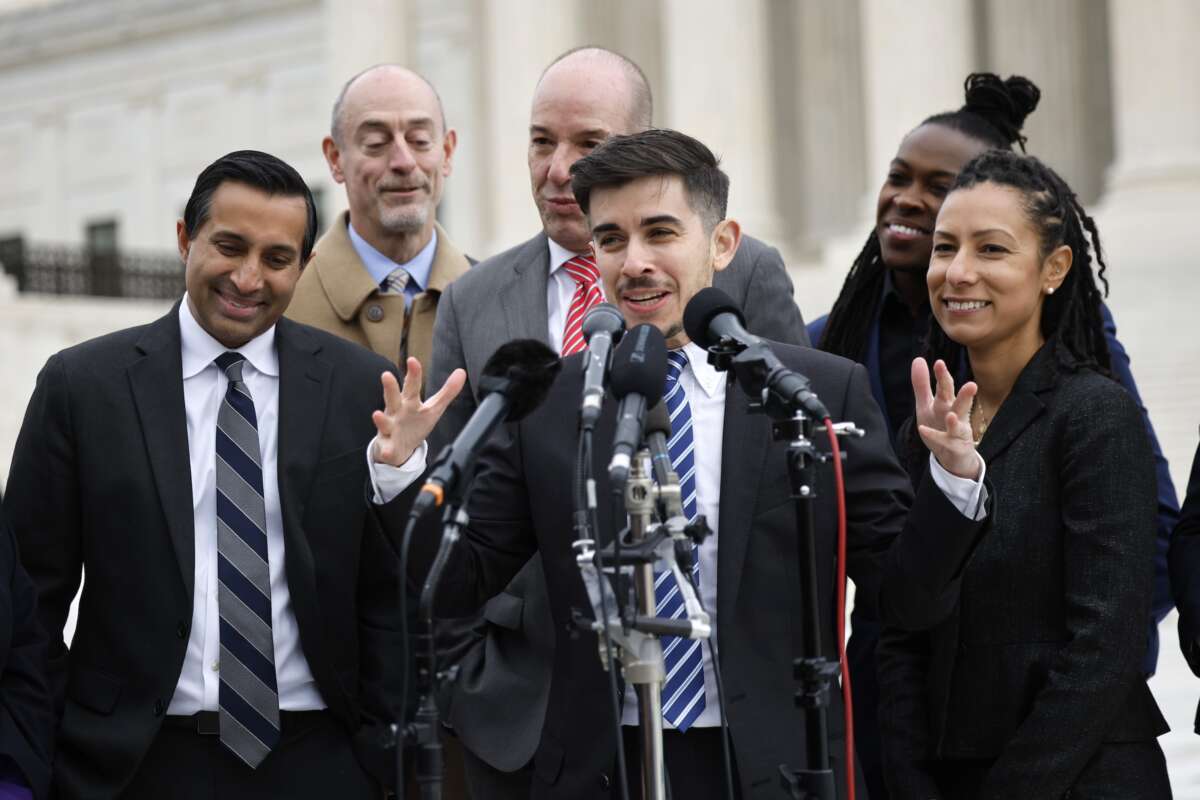
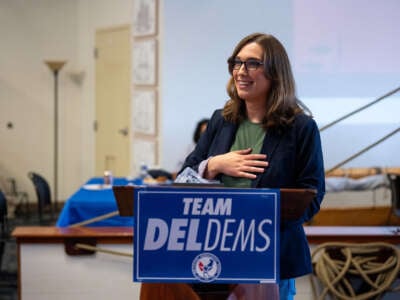

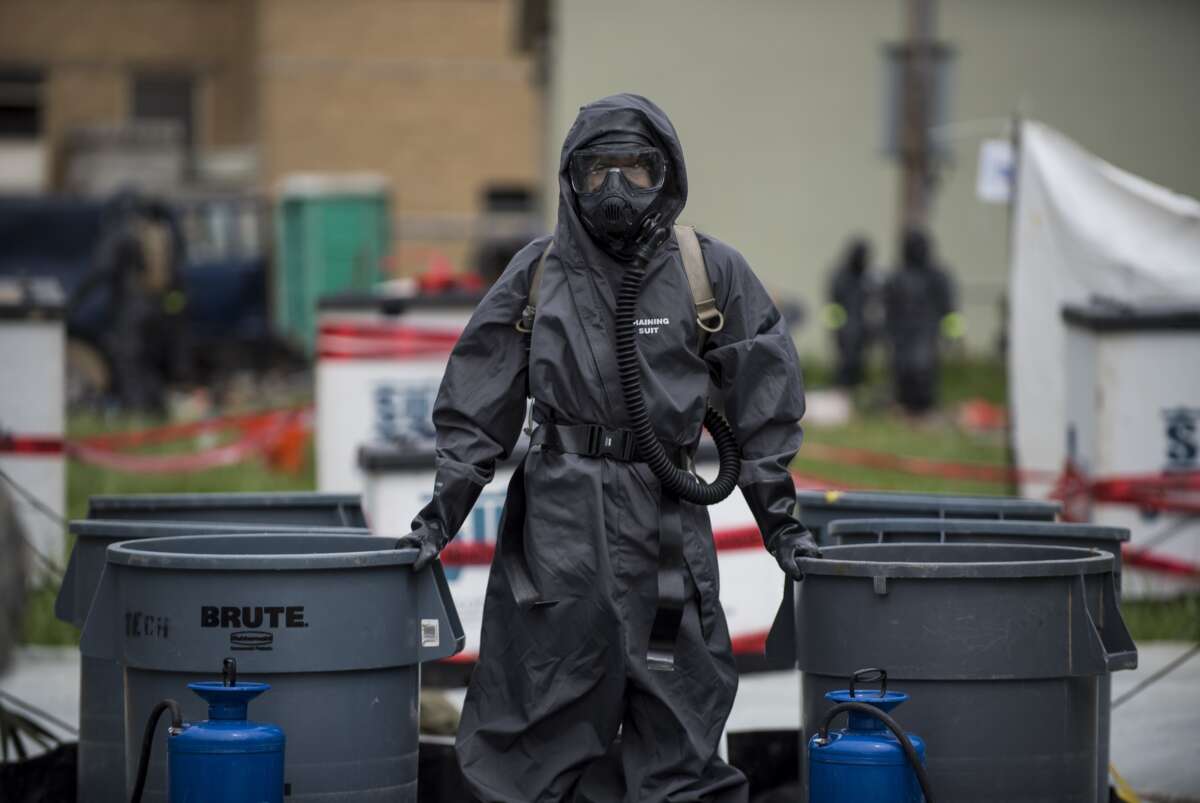

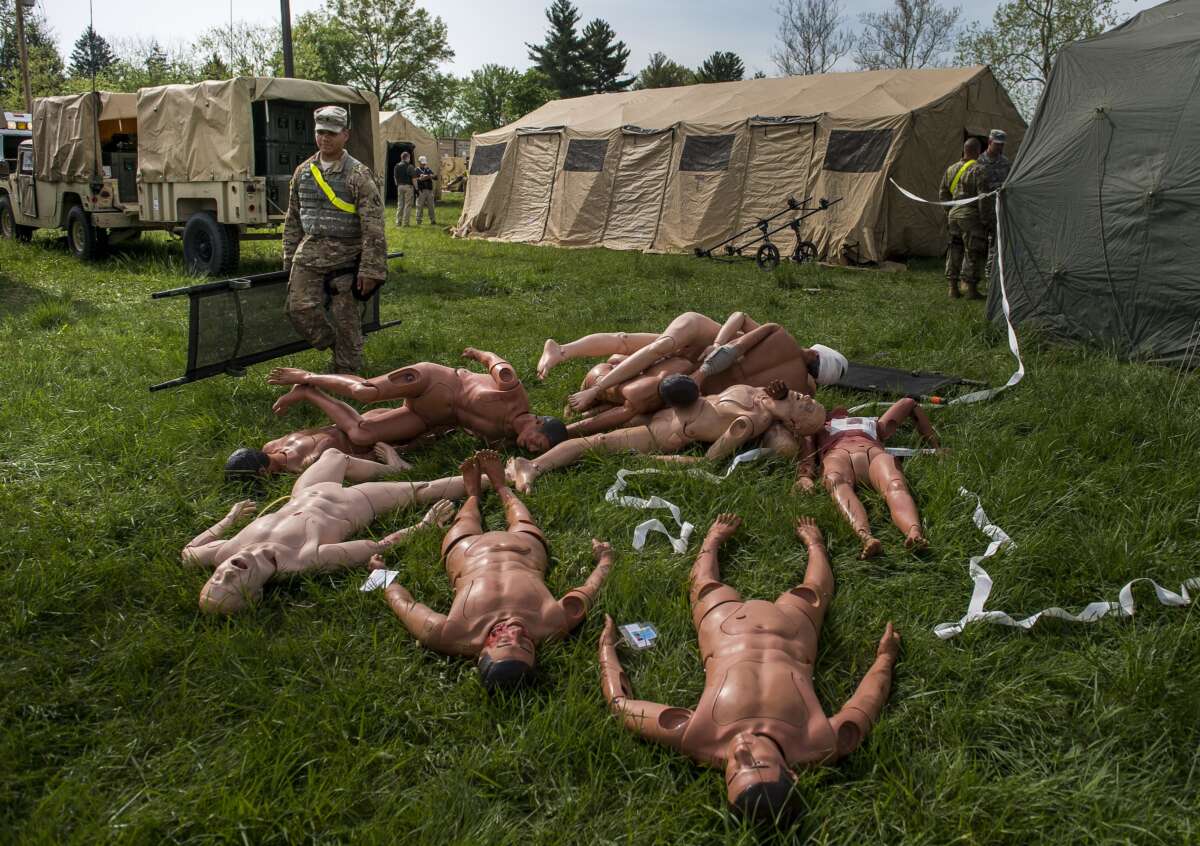 A U.S. Army soldier carries a stretcher through a decontamination training site at the Muscatatuck Urban Training Center, Indiana.
A U.S. Army soldier carries a stretcher through a decontamination training site at the Muscatatuck Urban Training Center, Indiana.